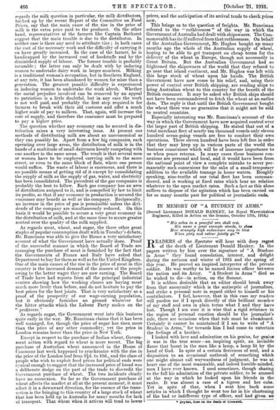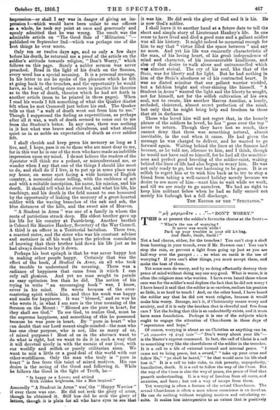IN MEMORY OF " A STUDENT IN ARMS."
(Second lieutenant DONALD HANKEY, 1st Royal Warwiekshire Regiment, Killed in Action on the Somme, October 12th, 1916.) "His ashes in a peaceful urn shall rest, His name a great =ample stands, to shout How strangely high endeavours may he blest When piety and valour jointly go."*
READERS of the Spectator will hear with deep regret of the death of Lieutenant Donald Hankey. In the papers written by him over the signature of " A Student in Arms " they found consolation, interest, and delight during the autumn and winter of 1915 and the spring of this year. He proved an inspired interpreter of the private soldier. He was worthy to be named -liaison officer between the nation and its Army. " A Student in Arms " died as he wished to die—in action, on the Somme.
It is seldom desirable that an editor should break away from that anonymity which is the antiseptic of journalism, and strike a personal note in regard either to himself or his contributors. I feel, however, that in this case my readers will pardon me if I speak directly of this brilliant member of my staff and own in plain terms what I and they have lost. Though I am sure it is wise that a rigid reticence -in the region of personal emotion should be the journalist's rule, there are occasions when that rule must be abandoned. Certainly it cannot be maintained if I am to write of " A Student in Arms," for towards him I had come to entertain the feelings of a brother.
I looked with love and admiration on his genius, for genius it was in the true sense—an inspiring spirit, an invisible flame that burnt in the man like a lamp, a lamp lit by the hand of God. In spite of a certain fierceness of soul, and a disposition to an occasional outbreak of something which one might almost call waywardness of judgment, he was at heart one of the most reasonable, and indeed humble-minded, men I have ever known. I used sometimes, though sharing to the full his admiration of the private soldier, to be amused at the way in which he looked upon his friends in the ranks. It was almost a case of a tigress and her cubs. Yet in spite of that, when I sent him back some articles in which I thought he went too far in his chastening of the bad or indifferent type of officer, and had given an • Dryden, linos on the death of Cromwell. Impression--or shall I say was in danger of giving an im- pression I—which would have been nn air to our officers as a whole, he took my point at once and generously and openly admitted that he was wrong. The result was the admirable article on " The Good Side of ' Militarism' "- published on September 2nd—which was perhaps one of the best things he ever wrote.
Only ten or twelve days ago, and so only a few days before his death, he returned me a proof of the article on the soldier's attitude towards religion, " Don't Worry," which follows on this page. Surely a nobler sermon was never
Read in the light of his death on the Somme,
every word has a special meaning. It is a personal message. In his letter to me he spoke of the pleasure which he felt at going back to the trenches, and the opportunity he would have, as he said, of testing once more in practice his theories as to the fear of death, theories which he had set forth in another article (soon to be printed in these pages). When I read his words I felt something of what the Quaker diarist felt when he met Cromwell just before his end. The Quaker tells us that " a waft of death went out from him to me." Though I suppressed the feeling as superstitious, as perhaps after all it was, a waft of death seemed to come out to me from the Student's letter. In any case, there was nothing in it but what was brave and chivalrous, and what should quiet us in as noble an expectation of death as ever soldier felt.
I shall cherish and keep green his memory as long as I
live, and I hope, pass it on to those who are most dear to me, for in this war he is one of the men who have made an indelible impression upon my mind. I do not believe the readers of the Spectator will think me a pedant, or misunderstand me, or wonder when I say that one of the things I should like most to do, and shall do if I live, is to put up in some place near my home, on some spot facing a wide horizon of English country, a memorial stone telling, with the emblems of art and with a suitable inscription, his name, his mission, and his death. It should tell what he stood for, and what his life, his teachings, and his death in the field meant to one honoured by the opportunity of linking the memory of a great-hearted soldier with the waving branches of the oak and ash, the blue distances of the hills, and the sweet airs of Heaven.
" A Student in Arms " was one of a family in whom the roots of patriotism struck deep. His eldest brother gave up his life for his country at Paardeberg. Another brother is Colonel Sir Maurice Hankey, Secretary of the War Council. A third is an officer in a Territorial battalion. These two, a married sister, and the sister who was his constant adviser and sustainer in all his work have the priceless consolation of knowing that their brother laid down his life just as he had always desired to lay it down.
Perhaps his best epitaph is that he was never happy but
in making other people happy. Certainly that was the effect of the book, A Student in Arms, on all who took the trouble to understand its meaning. There was a radiance of happiness that came from it which I can only call glorious. And yet no man sought to parade an easy optimism less than he did. The notion of his trying to write " an encouraging book " was, I know, never in his mind. He wrote because of the over- mastering spirit within him, and thus his work was happy and made for happiness._ It was " blessed," and so was he who wrote it, in what I am sure is the true' meaning of the Sermon on the Mount : " Blessed are the pure in heart, for they shall see God." To see God, to realize God, must be the• supreme happiness, and something of this he possessed because he was pure in heart. By pure. in heart " who can doubt that our Lord meant single-minded--the man who has one clear purpose, who is not, like so many of us, of mixed purposes ? Most of us in the abstract want to do what is right, but we want to do it in such a way that it will dovetail nicely in with the mosaic of our lives, with our worldly and selfish or purely utilitarian aims. We want to mix a little or a good deal of this world with our other-worldliness. Only the man who truly is " pure in heart " is free from this taint of mixed motives. His one desire is the seeing of the Good and following it. While he follows the Good in the light of Truth, he- " Is happy as a Lover; and attired
With sudden brightness, like a Man inspired."
Assuredly " A Student in Arms " Was: the " Happy Warrior " if ever there was one. He did not seek the glory of arms, though he obtained it. Still less did he seek the glory of letters, • though it is plain for all who have eyes to see that it was his. He did seek the glory of God and it is his. He is now God's soldier.
I shall leave it to another hand at a future date to tell the short and simple story of Lieutenant Hankey's life. In one sense to have lived and died a good man and a gallant soldier was all his history. It might indeed be memorial enough for him to say that virtue filled the space between " and say no more. And yet his life was eminently characteristic of the man, of his loving heart, of his great independence of ki mind and character, of his immeasurable ad ess, and also of that desire to walk alone and untrammelled which was almost stoical. The cry of his soul, like that of the Stoic, was for liberty and for light. But he had nothing in him of the Stoic's aloofness or of his contracted heart. It was no dieted scimitar that our gallant warrior wielded, but a falchion bright and clear-shining like himself. " A Student in Arms" wanted the light and the liberty he sought, not for himself, not for the selfish cultivation of his own soul, not to create, like another Marcus Aurelius, a lonely, secluded, cloistered, almost secret perfection of the mind, but only that he might bring help and freedom to those that sit in darkness.
Those who loved him will not regret that, in the homely phrase of the soldiers he loved, he has " gone over the top ' never to return. Though they have lost so much, they cannot deny that there was something natural, almost inevitable, in the end when it came. He had given the message he was charged to deliver, and he wanted to go forward again. Waiting behind the lines at the Somme had become, as lie told me, irksome to him, and I think, though he would not have said so himself, for he had all the sensitive- ness and perfect good breeding of the soldier-saint, waiting behind the lines of life had also begun to weary him. He was not only ready to go, but was hastening to be gone. It is as selfish to regret him or to wish him back as to try to stop a friend from taking a well-earned holiday merely because we desire to see more of him—want him to wait while we work, and till we are ready to go ourselves. We had no right to keep him militant below when he had so fully earned not merely his furlough but a full discharge.
THE EDITOR Or THE " SPECTATOR."



































 Previous page
Previous page